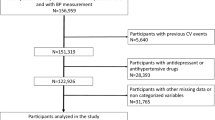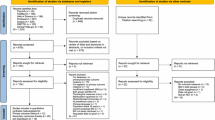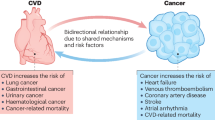Abstract
Objective
To describe the relationship between metabolic health parameters and depressive symptoms and perceived stress, and whether the co-occurrence of these two psychological stressors has an additive influence on metabolic dysregulation in adults at different levels of body mass index (BMI) without diabetes.
Methods
Participants without diabetes (N = 20,312) from the population-based REasons for Geographic And Racial Differences in Stroke (REGARDS) study (recruited between 2003–2007) who had a body mass index (BMI) ≥ 18.5 kg/m2 were included in this cross-sectional analysis. Mean age of sample was 64.4 years, with 36% African American, and 56% women. Depressive symptoms and perceived stress were measured using brief versions of the Center for Epidemiologic Studies Depression (CES-D-4 item) questionnaire and Cohen Perceived Stress Scale (PSS), respectively. Metabolic health parameters included waist circumference, blood pressure (systolic and diastolic), low- and high-density lipoprotein (LDL, HDL) cholesterol, triglycerides, fasting glucose, and high sensitivity C-reactive protein (hs-CRP). Sequentially adjusted general linear regression models (GLM) for each metabolic parameter were used to assess the association between having both elevated depressive symptoms and stress, either of these psychological risk factors, or none with all analyses stratified by BMI category (i.e., normal, overweight, and obesity).
Results
The presence of elevated depressive symptoms and/or perceived stress was generally associated with increased waist circumference, higher CRP, and lower HDL. The combination of depressive symptoms and perceived stress, compared to either alone, was typically associated with poorer metabolic health outcomes. However, sociodemographic and lifestyle factors generally attenuated the associations between psychological factors and metabolic parameters.
Conclusions
Elevated depressive symptoms in conjunction with high levels of perceived stress were more strongly associated with several parameters of metabolic health than only one of these psychological constructs in a large, diverse cohort of adults. Findings suggest that healthy lifestyle factors may attenuate the association between psychological distress and metabolic health impairment.
This is a preview of subscription content, access via your institution
Access options
Subscribe to this journal
Receive 12 print issues and online access
$259.00 per year
only $21.58 per issue
Buy this article
- Purchase on Springer Link
- Instant access to full article PDF
Prices may be subject to local taxes which are calculated during checkout

Similar content being viewed by others
References
Mottillo S, Filion KB, Genest J, Joseph L, Pilote L, Poirier P, et al. The metabolic syndrome and cardiovascular risk: a systematic review and meta-analysis. J Am Coll Cardiol. 2010;56:1113–32.
Eckel RH, Grundy SM, Zimmet PZ. The metabolic syndrome. Lancet. 2005;365:1415–28.
Jensen MD, Ryan DH, Apovian CM, Ard JD, Comuzzie AG, Donato KA, et al. 2013 AHA/ACC/TOS guideline for the management of overweight and obesity in adults: a report of the American College of Cardiology/American Heart Association Task Force on Practice Guidelines and The Obesity Society. Circulation. 2014;129(25 Suppl 2):S102–38.
Sena CM, Pereira AM, Seiça R. Endothelial dysfunction—a major mediator of diabetic vascular disease. Biochim Et Biophys Acta (BBA) - Mol Basis Dis. 2013;1832:2216–31.
Hajer GR, van Haeften TW, Visseren FLJ. Adipose tissue dysfunction in obesity, diabetes, and vascular diseases. Eur Heart J. 2008;29:2959–71.
Egan BM, Greene EL, Goodfriend TL. Insulin resistance and cardiovascular disease. Am J Hypertens. 2001;14(6, Supplement 1):S116–S125.
Bergmann N, Gyntelberg F, Faber J. The appraisal of chronic stress and the development of the metabolic syndrome: a systematic review of prospective cohort studies. Endocr Connect. 2014;3:R55–80.
Bove M, Carnevali L, Cicero AFG, Grandi E, Gaddoni M, Noera G, et al. Psychosocial factors and metabolic parameters: Is there any association in elderly people? The Massa Lombarda Project. Aging Ment Health. 2010;14:801–6.
Butnoriene J, Bunevicius A, Norkus A, Bunevicius R. Depression but not anxiety is associated with metabolic syndrome in primary care based community sample. Psychoneuroendocrinology. 2014;40:269–76.
Morikawa M, Okamoto N, Kiuchi K, Tomioka K, Iwamoto J, Harano A, et al. Association between depressive symptoms and metabolic syndrome in Japanese community-dwelling older people: a cross-sectional analysis from the baseline results of the Fujiwara-kyo prospective cohort study. Int J Geriatr Psychiatry. 2013;28:1251–9.
Pan A, Keum N, Okereke OI, Sun Q, Kivimaki M, Rubin RR, et al. Bidirectional association between depression and metabolic syndrome: a systematic review and meta-analysis of epidemiological studies. Diabetes Care. 2012;35:1171–80.
Räikkönen K, Matthews KA, Kuller LH. The relationship between psychological risk attributes and the metabolic syndrome in healthy women: Antecedent or consequence? Metabolism. 2002;51:1573–7.
Rhee SJ, Kim EY, Kim SH, Lee HJ, Kim B, Ha K, et al. Subjective depressive symptoms and metabolic syndrome among the general population. Progress Neuro-Psychopharmacol Biol Psychiatry. 2014;54:223–30.
Trief PM, Cibula D, Delahanty LM, Weinstock RS. Depression, stress, and weight loss in individuals with metabolic syndrome in SHINE, a DPP translation study. Obes (Silver Spring). 2014;22:2532–8.
Howard VJ, Cushman M, Pulley L, Gomez CR, Go RC, Prineas RJ, et al. The reasons for geographic and racial differences in stroke study: objectives and design. Neuroepidemiology. 2005;25:135–43.
National Institute on Alcohol Abuse and Alcoholism (NIAAA). Drinking levels defined. In: http://www.niaaa.nih.gov/alcohol-health/overview-alcohol-consumption/moderate-binge-drinking, 2017.
Tsivgoulis G, Judd S, Letter AJ, Alexandrov AV, Howard G, Nahab F, et al. Adherence to a Mediterranean diet and risk of incident cognitive impairment. Neurology. 2013;80:1684–92.
Melchior LA, Huba G, Brown VB, Reback CJ. A short depression index for women. Educ Psychol Meas. 1993;53:1117–25.
Radloff LS. The CES-D scale: a self-report depression scale for research in the general population. Appl Psychol Meas. 1977;1:385–401.
McClellan WM, Abramson J, Newsome B, Temple E, Wadley VG, Audhya P, et al. Physical and psychological burden of chronic kidney disease among older adults. Am J Nephrol. 2010;31:309–17.
Irwin M, Artin KH, Oxman MN. Screening for depression in the older adult: criterion validity of the 10-item Center for Epidemiological Studies Depression Scale (CES-D). Arch Intern Med. 1999;159:1701–4.
Cohen S. Perceived stress in a probability sample of the United States. In: Spacapan S, Oskamp S, (eds). The Claremont Symposium on Applied Social Psychology. The social psychology of health. Thousand Oaks, CA: Sage Publications; 1988. p. 31–67.
Cohen S, Kamarck T, Mermelstein R. A global measure of perceived stress. J Health Soc Behav. 1983;24:385–96.
Gillett SR, Boyle RH, Zakai NA, McClure LA, Jenny NS, Cushman M. Validating laboratory results in a national observational cohort study without field centers: the Reasons for Geographic and Racial Differences in Stroke cohort. Clin Biochem. 2014;47:243–6.
Alberti KGMM, Eckel RH, Grundy SM, Zimmet PZ, Cleeman JI, Donato KA. et al. Harmonizing the metabolic syndrome: A Joint Interim Statement of the International Diabetes Federation Task Force on Epidemiology and Prevention; National Heart, Lung, and Blood Institute; American Heart Association; World Heart Federation; International Atherosclerosis Society; and International Association for the Study of Obesity. Circulation. 2009;120:1640–5.
Pearson TA, Mensah GA, Alexander RW, Anderson JL, Cannon RO, Criqui M. et al. Markers of inflammation and cardiovascular disease: application to clinical and publichealth practice: a statement for healthcare professionals from the Centers for Disease Control and Prevention and the American Heart Association. Circulation. 2003;107:499–511.
Lasserre AM, Glaus J, Vandeleur CL, et al. Depression with atypical features and increase in obesity, body mass index, waist circumference, and fat mass: a prospective, population-based study. JAMA Psychiatry. 2014;71:880–8.
Cooper-McCann R, Ayers C, Albert M, de Lemos J, Neeland I, McClurkin M, et al. Abstract P093: Psychological Stress is Associated with Increases in Weight and Waist Circumference over Time: Longitudinal Data from the Dallas Heart Study. Circulation. 2014;129(Suppl 1):AP093–AP093.
Jane W, Yoichi C, Leigh GE, L. WK, Andrew S. Stress and adiposity: a meta‐analysis of longitudinal studies. Obesity. 2011;19:771–8.
Ridker PM, Buring JE, Cook NR, Rifai N. C-reactive protein, the metabolic syndrome, and risk of incident cardiovascular events: an 8-year follow-up of 14 719 initially healthy American women. Circulation. 2003;107:391–7.
Black PH. The inflammatory consequences of psychologic stress: relationship to insulin resistance, obesity, atherosclerosis and diabetes mellitus, type II. Med Hypotheses. 2006;67:879–91.
Paolucci EM, Loukov D, Bowdish DME, Heisz JJ. Exercise reduces depression and inflammation but intensity matters. Biol Psychol. 2018;133:79–84.
Milaneschi Y, Bandinelli S, Penninx BW, Vogelzangs N, Corsi AM, Lauretani F, et al. Depressive symptoms and inflammation increase in a prospective study of older adults: a protective effect of a healthy (Mediterranean-style) diet. Mol Psychiatry. 2011;16:589–90.
Cummings DM, Kirian K, Howard G, Howard V, Yuan Y, Muntner P, et al. Consequences of comorbidity of elevated stress and/or depressive symptoms and incident cardiovascular outcomes in diabetes: results from the REasons for Geographic And Racial Differences in Stroke (REGARDS) study. Diabetes Care. 2016;39:101–9.
Butnoriene J, Bunevicius A, Saudargiene A, Nemeroff CB, Norkus A, Ciceniene V, et al. Metabolic syndrome, major depression, generalized anxiety disorder, and ten-year all-cause and cardiovascular mortality in middle aged and elderly patients. Int J Cardiol. 2015;190:360–6.
Strike PC, Steptoe A. Psychosocial factors in the development of coronary artery disease. Prog Cardiovasc Dis. 2004;46:337–47.
Bose M, Oliván B, Laferrère B. Stress and obesity: the role of the hypothalamic–pituitary–adrenal axis in metabolic disease. Curr Opin Endocrinol Diabetes Obes. 2009;16:340–6.
Rosmond R. Role of stress in the pathogenesis of the metabolic syndrome. Psychoneuroendocrinology. 2005;30:1–10.
Goldbacher EM, Matthews KA. Are psychological characteristics related to risk of the metabolic syndrome? A review of the literature. Ann Behav Med. 2007;34:240–52.
Hamer M, Molloy GJ, Stamatakis E. Psychological distress as a risk factor for cardiovascular events pathophysiological and behavioral mechanisms. J Am Coll Cardiol. 2008;52:2156–62.
Puustinen PJ, Koponen H, Kautiainen H, Mäntyselkä P, Vanhala M. Psychological distress predicts the development of the metabolic syndrome: a prospective population-based study. Psychosom Med. 2011;73:158–65.
Haffner SM. The metabolic syndrome: inflammation, diabetes mellitus, and cardiovascular disease. Am J Cardiol. 2006;97(2, Supplement 1):3–11.
Lorenzo C, Okoloise M, Williams K, Stern MP, Haffner SM. The metabolic syndrome as predictor of type 2 diabetes: the San Antonio heart study. Diabetes Care. 2003;26:3153–9.
Katon WJ, Rutter C, Simon G, Lin EHB, Ludman E, Ciechanowski P, et al. The association of comorbid depression with mortality in patients with type 2 diabetes. Diabetes Care. 2005;28:2668–72.
Carney RM, Freedland KE. Depression, mortality, and medical morbidity in patients with coronary heart disease. Biol Psychiatry. 2003;54:241–7.
Acknowledgements
The authors thank the other investigators, the staff, and the participants of the REGARDS study for their valuable contributions. A full list of participating REGARDS investigators and institutions can be found at http://www.regardsstudy.org.
Funding
This work was supported by a cooperative agreement U01‐NS041588 from the National Institute of Neurological Disorders and Stroke. Dr. Gowey was supported by NIDDK T32DK062710, UAB/AHRQ K12HS023009, and NIDDK P30DK056336. Drs. Safford and Khodneva were supported by R01 NHLBI R01 HL080477 and NHLBI K24 HL111154.
Author information
Authors and Affiliations
Corresponding author
Ethics declarations
Conflict of interest
The authors declare that they have no conflict of interest.
Rights and permissions
About this article
Cite this article
Gowey, M.A., Khodneva, Y., Tison, S.E. et al. Depressive symptoms, perceived stress, and metabolic health: The REGARDS study. Int J Obes 43, 615–632 (2019). https://doi.org/10.1038/s41366-018-0270-3
Received:
Revised:
Accepted:
Published:
Issue Date:
DOI: https://doi.org/10.1038/s41366-018-0270-3
This article is cited by
-
Relationship satisfaction and metabolic health parameters: a cross-sectional study in Burkinabe population of older adults
BMC Public Health (2024)
-
Potential metabolic monitoring indicators of suicide attempts in first episode and drug naive young patients with major depressive disorder: a cross-sectional study
BMC Psychiatry (2020)
-
Risks associated with the stroke predisposition at young age: facts and hypotheses in light of individualized predictive and preventive approach
EPMA Journal (2019)



